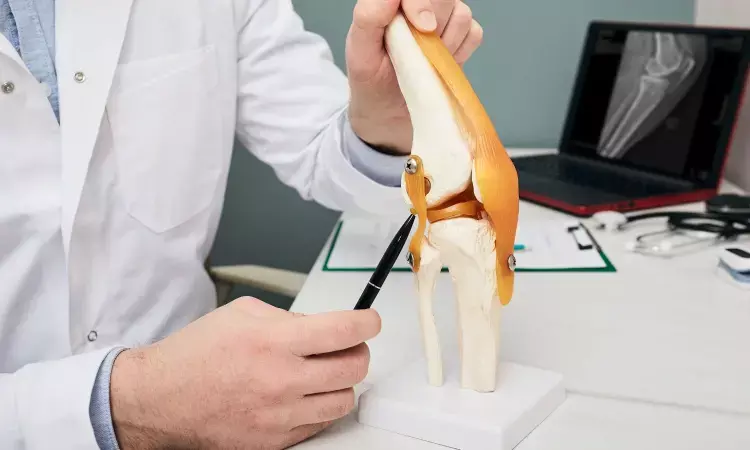- Home
- Medical news & Guidelines
- Anesthesiology
- Cardiology and CTVS
- Critical Care
- Dentistry
- Dermatology
- Diabetes and Endocrinology
- ENT
- Gastroenterology
- Medicine
- Nephrology
- Neurology
- Obstretics-Gynaecology
- Oncology
- Ophthalmology
- Orthopaedics
- Pediatrics-Neonatology
- Psychiatry
- Pulmonology
- Radiology
- Surgery
- Urology
- Laboratory Medicine
- Diet
- Nursing
- Paramedical
- Physiotherapy
- Health news
- Fact Check
- Bone Health Fact Check
- Brain Health Fact Check
- Cancer Related Fact Check
- Child Care Fact Check
- Dental and oral health fact check
- Diabetes and metabolic health fact check
- Diet and Nutrition Fact Check
- Eye and ENT Care Fact Check
- Fitness fact check
- Gut health fact check
- Heart health fact check
- Kidney health fact check
- Medical education fact check
- Men's health fact check
- Respiratory fact check
- Skin and hair care fact check
- Vaccine and Immunization fact check
- Women's health fact check
- AYUSH
- State News
- Andaman and Nicobar Islands
- Andhra Pradesh
- Arunachal Pradesh
- Assam
- Bihar
- Chandigarh
- Chattisgarh
- Dadra and Nagar Haveli
- Daman and Diu
- Delhi
- Goa
- Gujarat
- Haryana
- Himachal Pradesh
- Jammu & Kashmir
- Jharkhand
- Karnataka
- Kerala
- Ladakh
- Lakshadweep
- Madhya Pradesh
- Maharashtra
- Manipur
- Meghalaya
- Mizoram
- Nagaland
- Odisha
- Puducherry
- Punjab
- Rajasthan
- Sikkim
- Tamil Nadu
- Telangana
- Tripura
- Uttar Pradesh
- Uttrakhand
- West Bengal
- Medical Education
- Industry
Frailty tied to Adverse Events in RA Patients on Biologic and Targeted Synthetic DMARDs, finds study

It remains unknown whether frailty status portends an increased risk of adverse outcomes in patients with rheumatoid arthritis (RA) initiating biologic (b) or targeted synthetic disease-modifying anti-rheumatic drugs (tsDMARDs).
In an Original Article published in Arthritis Care & Research, Singh et al. and colleagues concluded that Patients with a history of rheumatoid arthritis who are treated with biologic (b) or targeted synthetic disease-modifying anti-rheumatic drugs (tsDMARDs) have an increased risk of adverse outcomes, with Frailty being a significant predictor.
Whether frailty status increases the risk of adverse outcomes in RA patients starting bDMARDs or tsDMARDs remains unclear.
The researchers used MarketScan data to identify new users of tumor necrosis factor inhibitors (TNFi), non-TNFi, bDMARDs, or Janus Kinase inhibitors (JAKi) for RA between 2008 and 2019. Patients' baseline frailty risk scores were calculated using a Claims-Based Frailty Index, and frailty status was defined as ≥0.2. The primary outcome was time to severe infection, with secondary outcomes including time-to-any infection and all-cause hospitalizations. Cox proportional hazards were used to estimate adjusted hazard ratios (aHRs) and 95% confidence intervals (95% CI), and the significance of interaction terms between frailty status and drug class was assessed.
Important summary points are:
· 57,980 patients of mean age48.1 ± 10.1 were included.
· 83 % of patients started TNFi, 14 % started non-TNFi biologics, and 3% started JAKi.
· Among these, 3560, constituting 6%, were categorized as frail.
· Frailty was associated with a 50% increased risk of serious infections with aHR 1.5 and a 40% higher risk of inpatient admissions than non-frail patients among those who initiated TNFi.
· Frailty was also associated with a higher infection risk relative to non-frail patients among those on TNFi, non-TNFi or JAKi.
Concluding further, Frailty is a significant predictor for the risk of adverse outcomes among patients with RA treated with biologic b tsDMARDs.
Reference:
Singh, N et al. Frailty and risk of serious infections in patients with rheumatoid arthritis treated with biologic or targeted‐synthetic DMARDs. Arthritis Care & Research.
BDS, MDS in Periodontics and Implantology
Dr. Aditi Yadav is a BDS, MDS in Periodontics and Implantology. She has a clinical experience of 5 years as a laser dental surgeon. She also has a Diploma in clinical research and pharmacovigilance and is a Certified data scientist. She is currently working as a content developer in e-health services. Dr. Yadav has a keen interest in Medical Journalism and is actively involved in Medical Research writing.
Dr Kamal Kant Kohli-MBBS, DTCD- a chest specialist with more than 30 years of practice and a flair for writing clinical articles, Dr Kamal Kant Kohli joined Medical Dialogues as a Chief Editor of Medical News. Besides writing articles, as an editor, he proofreads and verifies all the medical content published on Medical Dialogues including those coming from journals, studies,medical conferences,guidelines etc. Email: drkohli@medicaldialogues.in. Contact no. 011-43720751


